

Introduction
The Bible has a considerable amount of information on the life of King Hezekiah. We are going to focus primarily on the revival he led and its results. We have added links to other aspects of his life in the “Sources” at the bottom of this post.
Background
The glory days for the nation of Israel were during the reigns of King David and his son, King Solomon. Following that era the nation continually deteriorated. A revival would occur from time to time, but nothing brought the nation back to anything like what David and Solomon enjoyed.
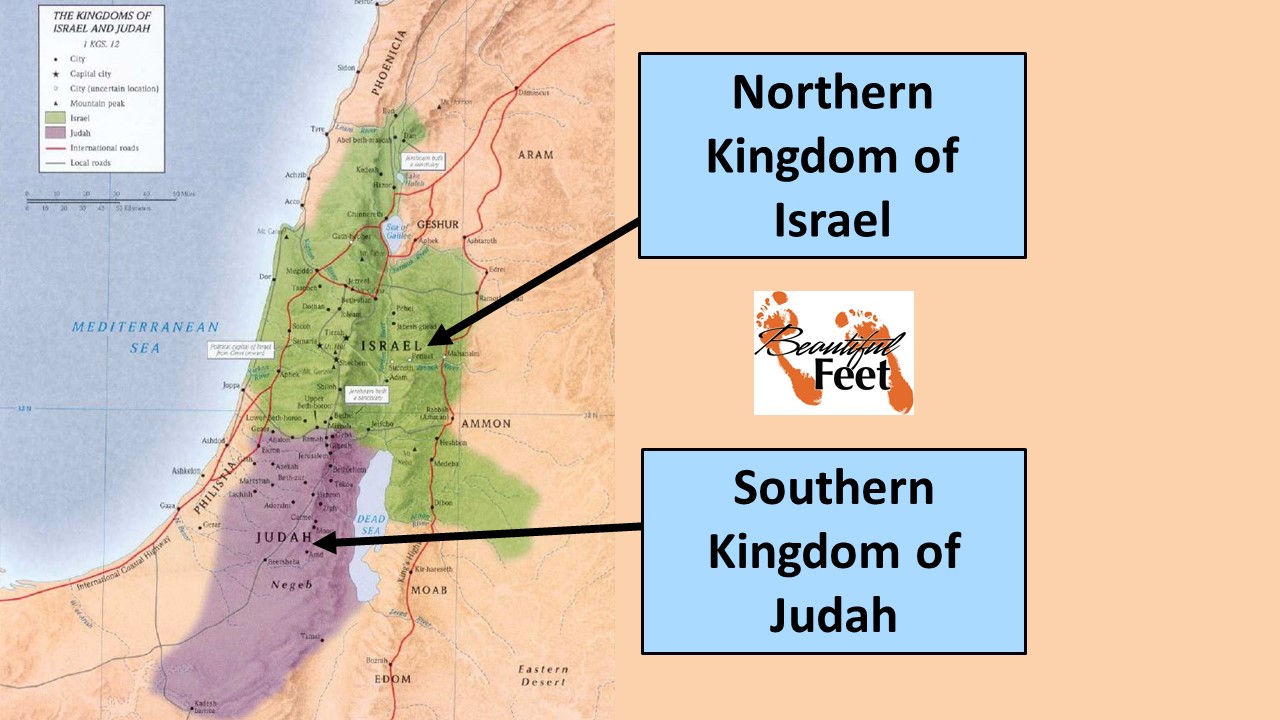
After Solomon’s death, and because of his sin, the nation was divided into two kingdoms (1 Kings 11:31-35)
King Hezekiah was one of the kings who led the southern Kingdom of Judah in a revival. Hezekiah came to the throne around 727 B.C., following his father, King Ahaz. Ahaz had been instrumental in plunging the Kingdom of Judah deep into idolatry—the worship of demons. He even offered his own children in sacrifice to these gods (2 Chronicles 28:1-4;.1 Kings 16:1-4). In addition, because of his rebellion against God, he willingly bowed to the Assyrians, allowing the Kingdom of Judah to become a vassal state in exchange for Assyria’s military protection (2 Kings 16:7-8; Read 2 Chronicles 28:1-27 for Ahaz’s long list of sins).
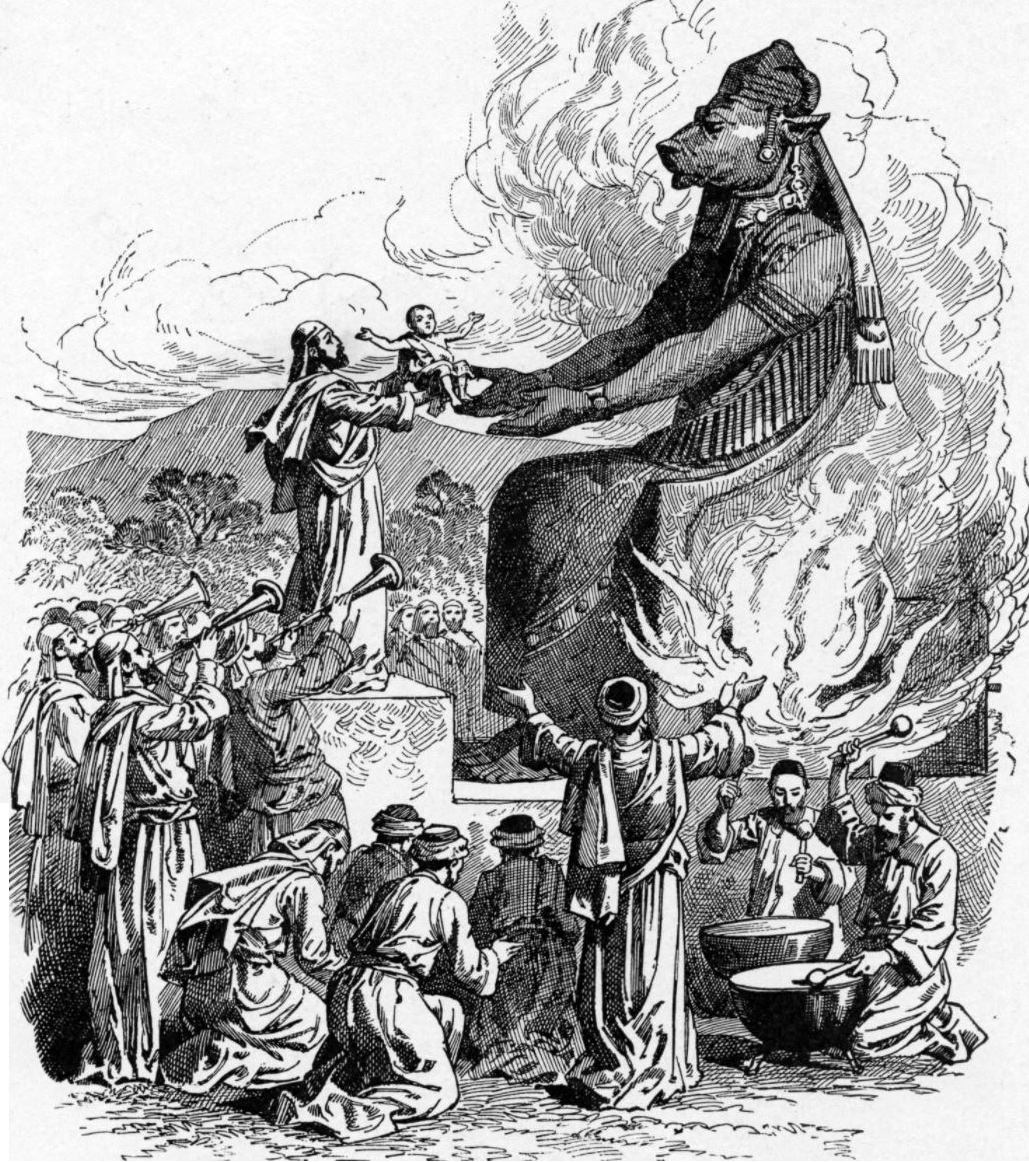
The god Molech, who was associated with child sacrifices (2 Kings 16:3)
The Revival
With the passing of Hezekiah’s father, King Ahaz, Hezekiah’s first act—during the first month of his reign as king—was to open the doors of the temple, which Ahaz had closed (2 Chronicles 29:3;.2 Chronicles 28:24). His subsequent steps as king:
► He put into motion steps to reinstate temple worship.
► The temple structure had to be repaired.
► The priests, who were not functioning under the reign of King Ahaz, had to be recruited, sanctified, and retrained.
► Pagan objects of worship were removed from the temple, then destroyed.
► The temple had to be ceremonially and physically cleansed.
(2 Chronicles 29:4-11)
With great enthusiasm behind the work the temple was ready to be put into service in only 16 days.
The Passover Planned
The commemoration of Israel’s release from slavery in Egypt was to be celebrated annually, which included a national meeting in Jerusalem. This celebration had not been observed wholeheartedly for many years and Hezekiah was determined to follow the Lord’s commands completely.
With Hezekiah only having come to his position as king two weeks before Passover, and with it taking more than two weeks to cleanse the temple and prepare it for conducting sacrifices and worship, it wasn’t possible to keep the Passover on its scheduled date. Knowing of a provision in the law that allows for the keeping of the Passover one month later, Hezekiah drew upon that provision and scheduled the Passover to happen the following month (Numbers 9:10-11).
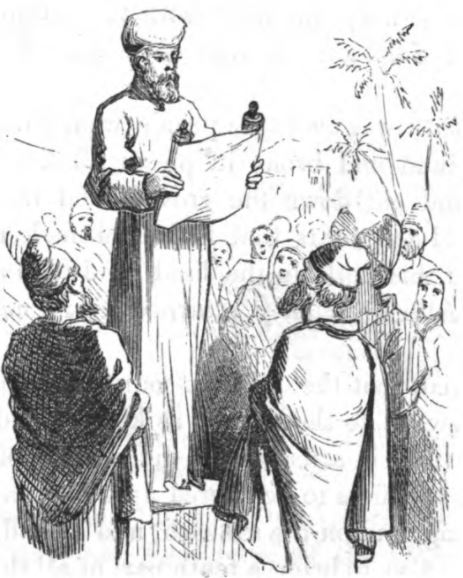
Hezekiah’s letter being read: 2 Chronicles 30:6-11
With the Passover expected to be celebrated by all Israelites, Hezekiah sent invitations to those in his own Kingdom of Judah, as well as to those in the northern Kingdom of Israel (2 Chronicles 30:5-11).
Most of the people from the Kingdom of Israel mocked and laughed at the ones bringing the invitation, though there were a few that humbled themselves and came (2 Chronicles 30:10-11).
Cleansing of Jerusalem
With the temple having been purified, the people then took to the streets of Jerusalem and they removed all the pagan altars and any remaining form of idolatry and destroyed them in the Kidron Valley (2 Chronicles 30:14).
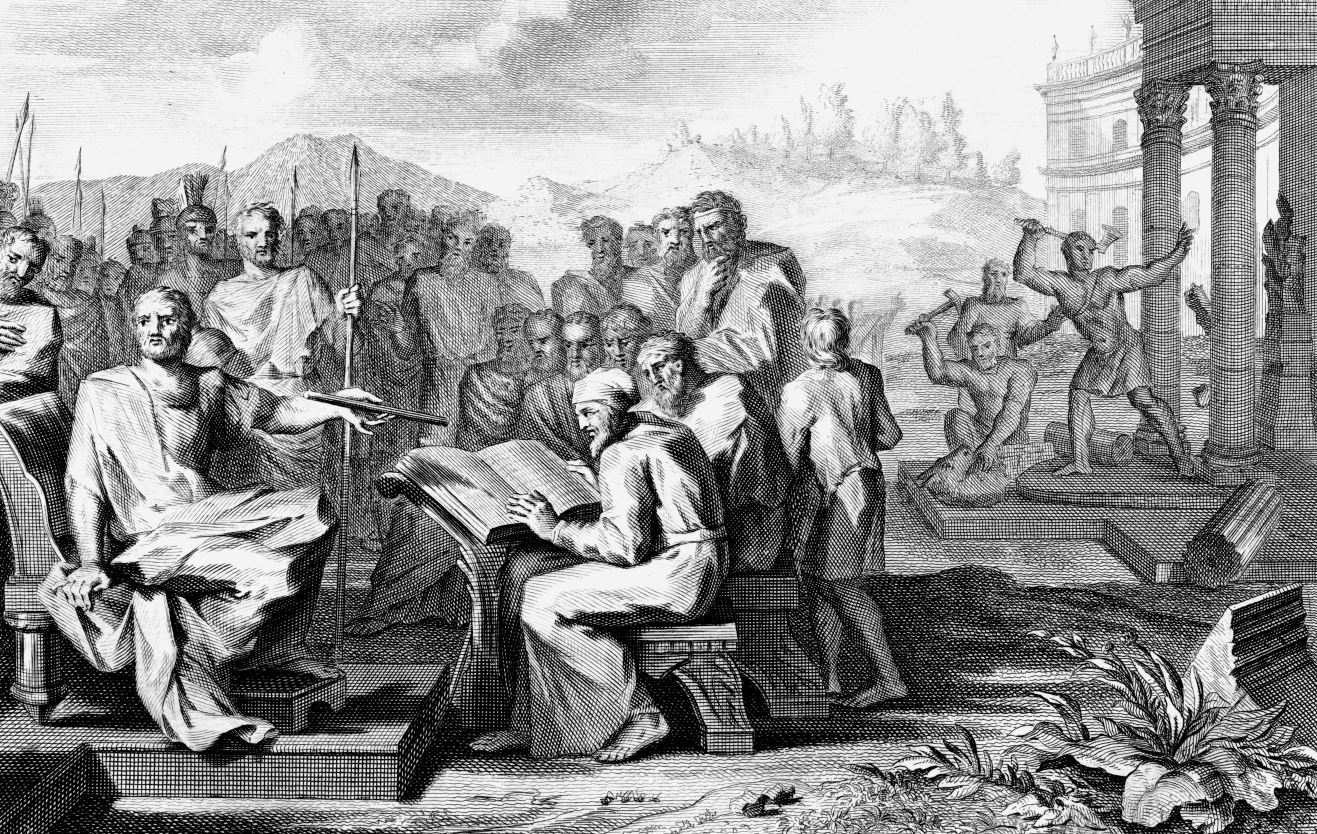
Initiating reforms and destroying idols
Passover Begins and the Unsanctified Forgiven
According to plan the Passover was started one month late (2 Chronicles 30:15), and because there were many who had never participated in a Passover, they were ignorant of the ceremonial cleansing that was required before they were permitted to eat the sacrificial lamb. Having failed in this procedure, Hezekiah prayed for their forgiveness “And the Lord listened to Hezekiah’s prayer and healed the people” (2 Chronicles 30:17-20).
For seven days the people celebrated the Festival of Unleavened Bread, being accompanied by music and singing, with many animal sacrifices being made (2 Chronicles 30:21-22).
Celebration Extended 7 Days
With such joy and rejoicing being experienced by the people, they didn’t want it to end, so they extended the Festival of Unleavened Bread for seven more days (2 Chronicles 30:21).
Further Cleansing of the Land of Idolatry
At the conclusion of the celebrations King Hezekiah sent the people home, giving them instructions to destroy all the pagan shrines. They were also directed to destroy all shrines built for worshiping the Lord, because all worship was required to be conducted in Jerusalem at the temple (Deuteronomy 12:1-32;.2 Chronicles 31:1).
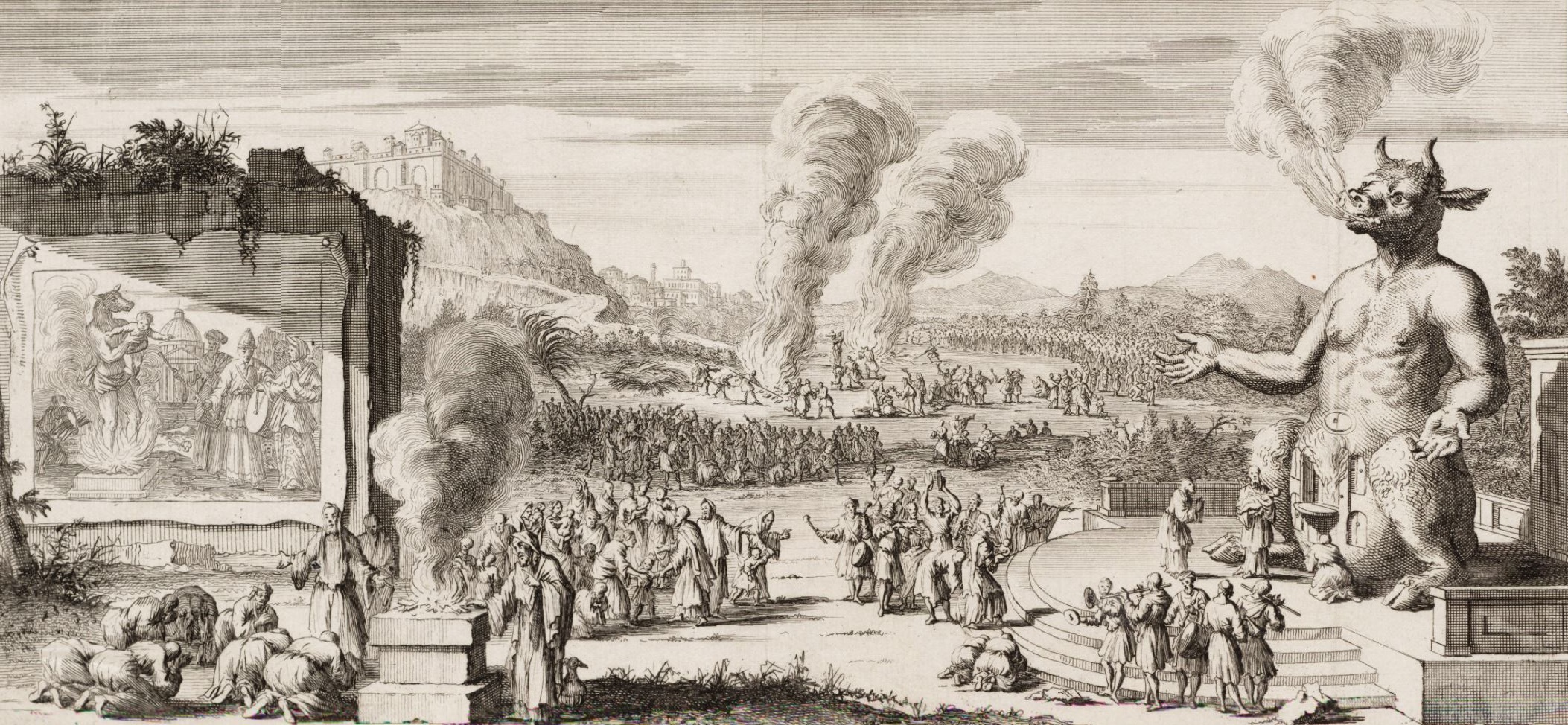
Child sacrifices to the god Molech (right click and open new tab for high resolution)
Nehushtan Destroyed
Six hundred ninety-six years earlier, during Moses’ time (Numbers 21:4-9), there had been an infestation of poisonous snakes (September 1423 B.C.). To bring healing to those bitten, God instructed Moses to make a bronze serpent and put it on a pole. If anyone was bitten by a snake, they were told to look at the bronze serpent, and through the exercise faith, God would heal them. But now, centuries later, the people were using the bronze serpent as an idol, which they named Nehushtan, and they were offering sacrifices to it. Because of this idolatry, Hezekiah ordered it to be destroyed (2 Kings 18:4).
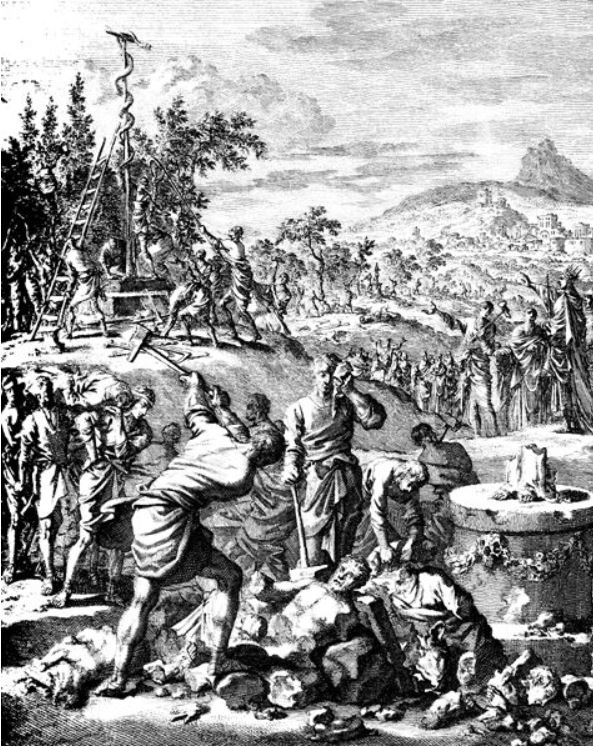
Destruction of Nehushtan and other idols (top left: Nehushtan)
Other Results of the Revival
► The 24 divisions of priests were organized (2 Chronicles 31:2).
► The daily, weekly, monthly, and annual sacrifices and observances were reinstituted (2 Chronicles 31:3).
► The support of priests and Levites by means of the tithes from the people was restored (2 Chronicles 31:4-10)
► The storerooms in the temple were prepared for the storage of the people’s tithes (2 Chronicles 31:11-15).
► A system was put in place to distribute food to all male Levites (2 Chronicles 31:16-19).
► There was honest and truthful carrying out the laws of the Lord (2 Chronicles 31:20-21).
► Hezekiah broke away from being a vassal of Assyria. King Ahaz had not only made an alliance with the Assyrians to gain their military assistance, but that act also caused the Kingdom of Judah to become a vassal of Assyria, requiring heavy taxation to be paid to them (2 Kings 16:7-8). When Hezekiah saw that the Lord was prospering him with whatever he did, he broke that alliance and quit paying the tribute money (2 Kings 18:7).
► King Hezekiah, knowing of the Lord’s favor upon him, attacked and defeated the Philistines, reclaiming some of the land that had originally been granted to Israel from the Lord (2 Kings 18:8).
Note the Secrets to King Hezekiah’s Success
► He obeyed the Lord with no hesitation (2 Chronicles 29:5, 36).
► His actions were pleasing and good in the sight of the Lord (2 Chronicles 31:20).
► He sought God wholeheartedly in all his actions (2 Chronicles 31:21).
► He trusted God, remained faithful, and obeyed all the commands given to Moses (2 Kings 18:5-6).
► His success can be attributed to the Lord always being with him (2 Kings 18:7).
Sources
► Hezekiah becomes king over the Kingdom of Judah:
2 Kings 16:20;.2 Chronicles 28:27
► Revival under Hezekiah and freedom from Philistines:
2 Kings 18:1-8;.2 Chronicles 29:1-36
► Passover kept, with invitations going throughout the Kingdoms of Judah and Israel:
2 Chronicles 30:1-27
► Idols destroyed throughout Judah, Ephraim, and Manasseh:
2 Chronicles 31:1
► Restoration of temple worship:
2 Chronicles 31:2-20
► Invasion of the Assyrians into the Kingdom of Judah:
2 Kings 18:9-37;.2 Chronicles 32:1-20; Isaiah 36:1-22
► Assyria fails in their attempt at overthrowing Jerusalem:
2 Kings 19:1-37;.2 Chronicles 32:21-23; Isaiah 37:1-38
► Hezekiah’s sickness, subsequent healing, then disclosure of his treasures to Babylonian envoys. Isaiah’s prophecy of Judah’s overthrow by the Babylonians.
2 Kings 20:1-21;.2 Chronicles 32:24-33; Isaiah 38:1-22; Isaiah 39:1-8
Return to List of Revival Stories
Chet & Phyllis Swearingen:
Office: (260) 920-8248
romans1015@outlook.com
Beautiful Feet
P.O. Box 915
Auburn, IN 46706

